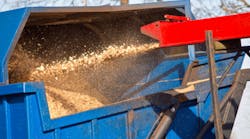Washington state’s Department of Labor & Industries (L&I) has cited an Everett, Wash., company for multiple safety violations related to the death of a worker last July. Nineteen-year-old Bradley Hogue was killed by a rotating auger while working inside the hopper of a bark-blower truck at a home.
The L&I investigation found that Pacific Topsoils’ workers regularly were assigned to clear jams in the bark-blower truck hoppers while the hoppers were operating. This exposed them to three very hazardous elements: a floor conveyor belt, two rotating-screw conveyors (angled augers) and a rotating stir rod. Exposure to any of these parts of the equipment potentially could result in entanglement, causing severe crushing injuries or death.
Working in and around this type of extremely hazardous equipment requires lockout/tagout safety procedures to prevent machinery from starting up or moving during service or maintenance by workers.
“The loss of this young man’s life is a tragedy that could have been prevented if the employer had followed basic safety and health rules that protect workers from moving machinery,” said L&I Assistant Director Anne Soiza. “We hope this citation and the penalties serve as a deterrent so that nothing like this ever happens again.”
Pacific Topsoils was cited for two willful and 14 serious violations, with penalties totaling $199,000. The employer also has been identified as a severe violator and will be subject to follow-up inspections to determine if the conditions still exist in the future.
A willful violation can be issued when L&I has evidence of plain indifference, a substitution of judgment or an intentional disregard to a hazard or rule. The first willful citation was issued for not ensuring lockout/tagout procedures regularly were used; it carries a penalty of $56,000. The second willful violation was issued for not training the employees in the proper use of those critical procedures; it carries a $52,000 penalty.
Additionally, working in the hopper of bark-blower trucks exposed workers to confined space hazards. Confined spaces, like hoppers, are areas large enough to accommodate a worker, but aren’t designed for continuous employee occupancy and have limited ways to enter or exit.
When a confined space has one or more hazardous characteristics, such as moving machinery or a potential for engulfment that may harm workers, it’s considered a “permit-required” confined space. That means employers must control access to the area and use a permit system to prevent unauthorized entry. Anyone working in or around a permit-required confined space must be trained and there must be safety measures and rescue procedures in place.
Twelve of the serious violations cited were for failure to implement safe work practices when entering a permit-required confined space. Two other serious violations were cited for not having an effective accident prevention program and for failure to document lockout/tagout procedures. Each of these violations carries a $6,500 penalty. A serious violation exists in a workplace if there is a substantial probability that worker death or serious physical harm could result from a hazardous condition.
Pacific Topsoils has 15 working days to appeal the citation. Penalty money paid as a result of a citation is placed in the workers’ compensation supplemental pension fund, helping workers and families of those who have died on the job.
Following the July incident that killed Hogue, L&I issued a bark and mulch-blower hazard alert to warn others in the landscaping business of the danger of working in hoppers while the equipment is running.

